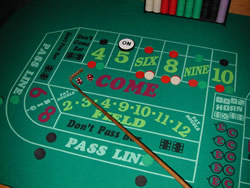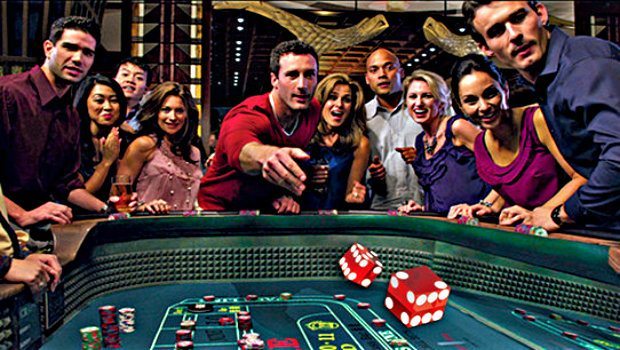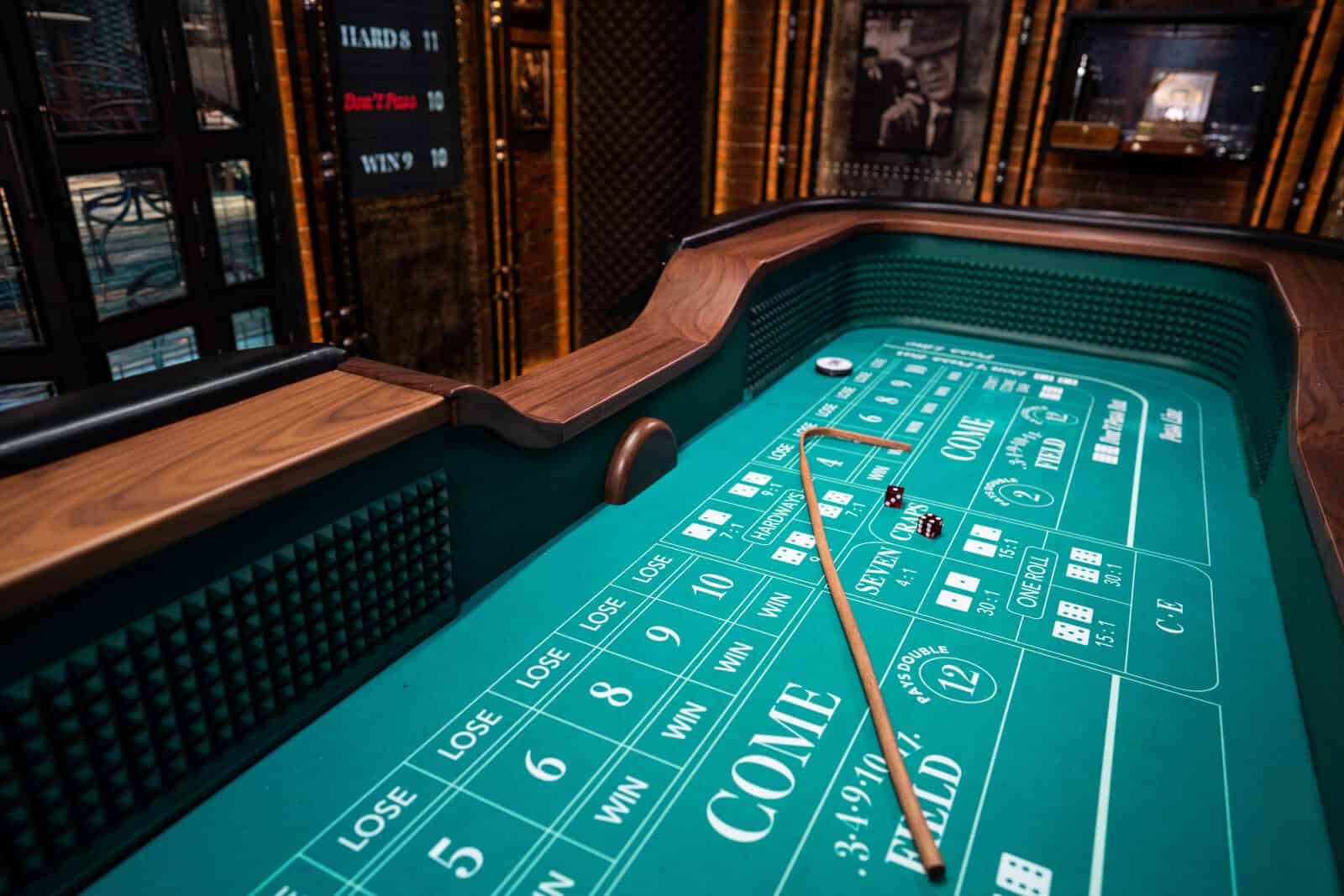Craps Rolling 7
Craps really isn’t complicated when you remember that the entire point is gambling on the sum on a pair of dice. One player rolls the dice, typically trying to get a 7 or 11. If they don’t get this number on the first roll, they establish a “point” number that they have to roll again before rolling a 7. When rolling a pair of dice, there are 36 possible arrangements. We can easily ascertain this by the formula of 6 2. Six represents the quantity of options each die offers. Two represents how many dice we have. Seven is the most important number in craps, but it has nothing to do with luck and everything to do with probability. If you roll two standard dice, you’ll produce 7s more often than any other total. No matter what number comes up on the first die, there is always a number on the second die that can bring the total to 7 (1+6, 2+5, etc.).
Playing a 'Hopping 7Â’s' Progression
By Jerry 'Stickman'
Periodically people ask me about craps betting systems. Almost all of them rely on the premise that certain numbers are due because they havenÂ’t appeared for a while. I normally tell them that in a random you cannot beat the math of the game. The house edge is the house edge. In the long term you will lose the amount of money played times the house edge.
For many that is enough, but every so often someone says they have won a lot of money on a particular system and want me to look further into it. So periodically I will devote an article to exploring some of these systems.
This article will look at a 'Hopping 7Â’s' progression.
Here is the system as it was stated to me.
- Start over with each new shooter.
- Wait seven rolls before starting the progression
- When the bet hits, take the bet down along with the win.
- Start with a $3 bet. Starting with the first bet, the progression is: 3, 3, 6, 9, 15, 24, 39, etc. always adding the previous two bets together to determine the next bet in the progression.
Here is a table that shows the bet, amount invested, win amount (taking the bet down), and profit.
What we have here is a Fibonacci progression. This and the Martingale progression are well known in betting systems. In 'up as you lose' progressions, the thought is that when your number hits you will recoup your losses and garner a little profit. The Fibonacci progression is the less aggressive of the two.
Either of these progressions works as long as two things are true. The first is you must have adequate bankroll to make it through the inevitable losing streaks you will encounter. The amount you require can be very substantial. The last row in the above table represents the 17th roll without a 7. While 17 rolls without a 7 appearing may be somewhat unusual, it is not that uncommon.
If the shooter goes 20 rolls without a 7 appearing, the bankroll required is almost $2,000.
If the shooter rolls just five more numbers without throwing a 7, the total invested is over $20,000.

And what is the shooter is extremely lucky and throws just 5 more numbers without a 7? Our hapless system player will have just over $225,000 invested.

If he should win on the 30th roll, he will win $233,000+, so maybe he thinks it is worth it.
If our lucky shooter goes five more rolls without a 7, however, the investment skyrockets to almost $2.5 million. I donÂ’t know about you, but if I had that kind of money, I wouldnÂ’t risk it on a craps game.
The second consideration before using this system is something called table maximum. Virtually every craps game has a maximum bet ranging from $2,000 and up. Most of them are $10,000 or less. That means in the unusual but very possible case of someone going 25 rolls without a 7, this player is out his entire investment of over $20,000 and he cannot continue.
The math of the hop bet says that a player will lose 11.11 percent of all money wagered on a random shooter. That is what the math says. LetÂ’s see what some simulations say. I ran several simulations specifying a random shooter through an excellent software program called Smart Craps from DeepNet Technologies.
The first simulation did not put any limits on the maximum bet. It assumed an unlimited bankroll and no maximum bet limit at the craps table. It was very interesting watching the running edge percentage as the simulation progressed. For the first several seconds the expectation was a little over 103%. This means that if someone were playing this system and had the same results as the simulation, they would more than double their bets!
This came to an abrupt halt after about 96,000 rounds. At this point the simulation terminated because it couldn’t handle the size of the bet being placed – over 2.2 billion dollars. It may have taken a while, but the long term hit at about 96,000 player rounds.
Next I put some limits on maximum bet size. I started with 1.1 billion dollars. If the simulation hit the limit, it would restart the progression; that is, wait for seven rolls without a 7, then begin betting the progression. After 10 million rounds, the expectation was 59 percent for the house! During the 10 million rounds the $1.1 billion limit was reached 7 times. This was much worse than what the math would indicate, but with such a large limit, the long term had most likely not yet been reached.
Three more simulations were run with limits of $10,000, $3,000 and $2,000. The results more closely matched the mathematical expectations.
As you can see, all of these fell much closer to the calculated expectations.
So what does this show? You may be lucky and win for a period of time. You may even win for a long period of time. You could also be very unlucky and lose very big for a while. Eventually, however the math will catch up with you.
In the long run, you cannot beat the math of the game with random shooters. You will lose the house edge of your bets times the amount bet. Accept the fact and bet the low house edge bets. Your bankroll will thank you.
May all your wins be swift and large and all your losses slow and tiny.
Jerry 'Stickman' is an expert in craps, blackjack and video poker and advantage slot machine play. He is a regular contributor to top gaming magazines. The 'Stickman' is also a certified instructor for Golden Touch Craps and Golden Touch Blackjack. For more information visit www.goldentouchcraps.com or www.goldentouchblackjack.com or call 1-886-738-3423. You can contact Jerry 'Stickman' at stickmanGTC@aol.com
.jpg/220px-Imperial_Palace%2C_Las_Vegas_(3192388546).jpg)
| 1 vote (4.54%) | |
| 6 votes (27.27%) | |
| 3 votes (13.63%) | |
| 4 votes (18.18%) | |
| 3 votes (13.63%) | |
| 4 votes (18.18%) | |
| 1 vote (4.54%) |
22 members have voted
Just wondering what craps players have seen along these lines. Anyone know of a 'record no-7'?
the shooter held the dice for more than an hour but surprisingly made few passes in that hour
and no 7s during the come-out rolls either, right?
I also marvel at how a good long hand can have not that many passes ... OR fail to hit any of my numbers generally
I had the last Southwest flight of of Vegas to Phoenix and I was worried that I wan't going to make the flight......so I was almost hoping he would 7 out.
The game slowed down to a crawl. Three deep around the table. There was very heavy action at the opposite end of the table. Dude probably made the point 20 times and rolled tons of numbers. Had the dice for what seemed well over an hour and a half, maybe longer.
Of course I didn't cash super big because I kept thinking the hammer was coming out. Pressed a little but didn't have the balls to leave more money out. Hindsight.
When he did finally crap the table gave the dude a huge ovation and lots of tips came his way including 2 pinks.
My buddy did well and was so liquored up that he insisted on tipping the pilot on the trip back to Phoenix.
and no 7s during the come-out rolls either, right?
I dont recall ANY sevens being thrown... until the very last throw of the dice for that shooter. And as I said, that would mean about 70 minutes of throwing without a 7.
As strange as it sounds, I once held the dice and rolled and rolled and NEVER threw a 7. Not on the come out , and not on my final throw either.
It was about 8 years ago and I drove up on a Friday night with a date. We reached Caesars at about midnight... and our room wasn't ready. 'Okay,' I said to the check in clerk, 'I'll be at the craps tables.'
Off we went... and my girlfriend was not happy at all. There was a craps table open with no players. She sat in a chair dozing off as I picked up the dice and rolled and rolled. I rolled for about 20 minutes when a manger from check-in came over and said the room was ready.
'Let's go NOW' the girlfriend said with authority that meant if I did not go right then I would not be sleeping in that room for the rest of the weekend.
So I took my bets down, colored up what was in my rail. left the passline bet (I could not remove it) and said 'it's for the dealers' and went to the room.
 No seven ever rolled. Not on the come out, and not when I was 'done.'
No seven ever rolled. Not on the come out, and not when I was 'done.'Jerry 'Stickman' rolled 76 times without a 7 either on the come-out rolls or during the point segment. As many of our readers know, 'Stickman' is an elite dice controller. That's the most I ever saw. (We usually have someone keep track of the sevens if the shooter never sets for a seven.) Sadly, the 77th number rolled was a seven --- kind of poetic. This occurred at Bellagio in 2008 before I was banned.
Craps Odds Of Rolling 7
I had an hour before we had to leave for the airport, and I got on a table with just a few players.The shooter set the point of 8 and made that point after a couple of rolls. He then rolled a couple of 7s on the Come Out roll.
His next point was a 10, which he never made.
45 minutes later, I am sweating, needing to leave for the airport, but unwilling to leave. It was a relief when the 7 came.
I didn't have much on the table ($75 each on 5/9, and $90 each on 6/8). Getting paid $105 each time
Craps Odds Rolling 7
Total win on his roll was $3500, so the minimum number of throws he had was 45 or so (I took a long time to press to $90 back then)
i was so excited to get to a casino.... i thought it would be like taking money
from a baby...... however at the casino next time it was like every other roll
was a 7.
dicesetter